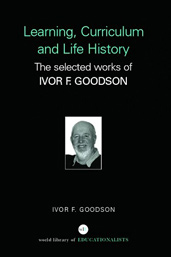Learning, Curriculum and Life Politics: the selected works of Ivor F. Goodson
Becoming a School Subject
Conclusion
The establishment of geography - how geography was rendered a discipline - was a protracted, painstaking and fiercely contested process. The story is not of the translation of an academic discipline, devised by ('dominant') groups of scholars in universities, into pedagogic version to be used as a school subject. Rather the story unfolds in reverse order and can be seen as a drive on the part of low status groups at school level progressively to colonize areas within the university sector - thereby earning the right for scholars in the new field to define knowledge that could be viewed as a discipline. The process of development for school subjects can be seen not as a pattern of disciplines 'translated' down or of 'domination' downwards but very much as a process of 'aspiration' upwards.
To summarize the stages in the emergence of geography: in the earlier stages teaching was anything but 'messianic', for the subject was taught by non-specialists and comprised a 'dreary collection of geographical facts and figures'. The threshold for take-off on the route to academic establishment began with MacKinder's remarkably successful recipe for the subject's promotion drawn up in 1903. In the MacKinder manifesto the geography teacher is to set the exams and is to choose exams that are best for the 'common acceptation' of the subject, the teaching of geography is to be exclusively in the hands of trained geographers and the universities are to be encouraged to establish schools of geography 'where geographers can be made'.
The strategy offered solutions for the major problems geography faced in it development. Most notable of these was the idiosyncratic and information-based nature of school geography. Initially the subject stressed personal, pedagogic and vocational arguments for its inclusion in curricula: 'we seek to train future citizens' and moreover a citizen 'must have a topographical background if he is to keep order in the mass of information which accumulates in the course of this life' (1919). Later the subject was advocated because 'travel and correspondence have now become general (1927). But the result of these utilitarian and pedagogic emphases was that comments arose as to the 'expansiveness' of the subject and the fact that it came 'more and more to be a 'world citizenship' subject' (1930s).
